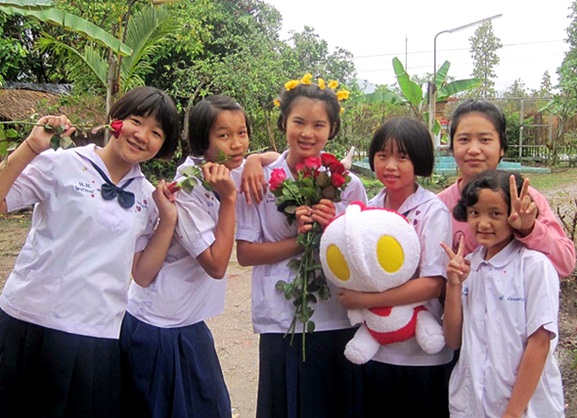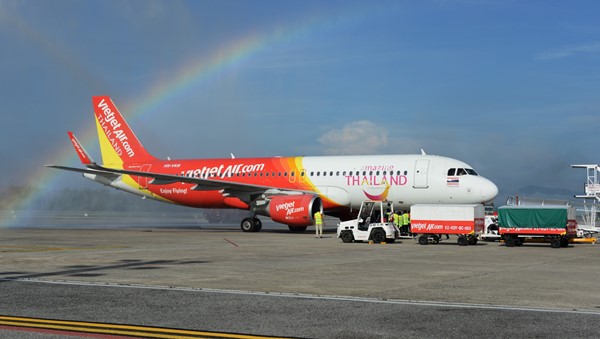
There’s a huge EFL teaching market in Thailand to teach both children and adults but, most western EFL teachers choose to teach children, thinking the opportunities are better.
If you’re trying to decide if you should teach EFL to children or teach adults instead, there are actually several pros and cons to consider before you decide. In fact, an EFL teacher should consider the pros and cons carefully before deciding whether or not to teach EFL to kids in Thailand, as making the wrong decision can make your teaching life hell.
The Pros of Teaching EFL to Children in Thailand – There are many positives to teaching EFL to children in Thailand, so choosing to teach children is often a personal decision. I taught Thai children EFL for more than four years and, during that time, found the pros always outweighed the cons.
1. Thai children are much more relaxed, happy and friendlier than most western kids I found. Thai kids are actually a joy to teach as they love to laugh, they like to have fun and they don’t take anything too seriously.
As a teacher, of course, the ‘not taking things too seriously’ can be annoying but Thai kids being so happy really does make your EFL teaching experience enjoyable.
2. In Thailand there are many more jobs for teachers who are willing to teach EFL to children than there are for EFL teachers who want to teach adults. For every job listing asking for EFL teachers for corporate English (teaching adults) there are 30 more ads looking for EFL teachers for children.
3. Work permits are usually easier to get in Thailand for EFL teachers who are willing to teach children. Corporations can find it difficult to get a work permit for a teacher as the cost for a corporate work permit is much higher than for a work permit teaching in a school.
4. Most jobs teaching children are full-time and offer benefits like health insurance, sick leave and paid vacations. At the bi-lingual school I taught at, we got 8 weeks paid vacation every year – much higher than any corporate English teaching job. Most jobs for corporate EFL teaching adults are part-time, so you have to piece together a few jobs just to make one full-time salary.
5. Teaching EFL to children in Thailand will also usually get you a free lunch too. Most of the Thai schools give free lunch to their teachers and the Thai food they serve isn’t bad either. It doesn’t sound like much, but even at a minimal 50 baht for lunch, that saves you 1,100 baht a month, more than $32 a month or almost $499 a year.
6. Teaching EFL to kids, you are usually in a school with several other western teachers. In many businesses teaching adults, you might be the only western teacher, which can get very lonely especially if your adult students don’t speak much English.
7. I discovered you learn a lot more about Thai culture teaching EFL in schools as the kids always participate in ceremonies for Mothers’ Day, Fathers’ Day, Songkran, Loy Krathong, Makha Bucha Day, Chinese New Year and more.
The Cons of Teaching EFL to Children in Thailand – There are definitely some cons to teaching EFL to children in Thailand, but you have to consider which cons are important to you:
1. Overall, if you teach EFL to children, you will probably make less money than if you taught EFL to corporate adult students. Average salary in Bangkok teaching EFL to children full-time is between 35,000 and 55,000 baht every month. Average salary to teach EFL to adult corporate students starts at 55,000 and goes up to 85,000 or more for a full-time position.
2. If you teach in a Thai school, there are always a lot more rules about dress code, attendance and general annoying Thai things, than there are at corporations. Thailand is a very hot country, so stuck with antiquated dress codes can be extremely uncomfortable for some westerners.
3. If you teach EFL to children in Thailand, at most schools you are forced to be at school from 7:30am to at least 4:30 pm every day. Teaching corporate adult students EFL, you are often able to leave work during the day if you’re not teaching.
4. Some schools in Thailand require their teachers to wear a uniform. Enough said.
5. Several times a year, you will be expected to work on Saturdays for special events like carnivals, sports day, parents meetings and, in my case, even a twice-annual art contest where our school hosted kids from other area high schools.
6. Many Thai teachers in Thai schools do not speak much English, so it’s very difficult to make Thai friends.
7. Where Thai teachers make on average of 8,000 to 10,000 baht per month and western teachers on average 35,000 to 55,000, you can only imagine how difficult it is to make Thai friends as most of the Thai teachers cannot afford to go to the places western teachers can go to.
8. Thai kids are very lazy and Thai schools often pass them in every subject even if they are actually failing. Western teachers get very upset about this grade-changing system but you can’t fight the system because it happens everywhere.
9. A lot of Thai schools are inconveniently located for sky train or underground stations, so you might spend a long time on a bus trying to get to school in a morning, or a lot of money on taxis.
10. Thai schools require a lot of paperwork – lesson plans for every class, weekly reports, monthly reports, reports for parent’s days, photocopying for many of your classes, letters to parents and much more. If you’re not a big report or paperwork person, this alone can push you over the edge when it comes to teaching EFL to Thai kids.
I liked teaching EFL to Thai kids so, for more, the pros definitely outweighed the cons. For others, teaching EFL to children is just not their ‘thing’, as teaching EFL to adults would fit their personality and needs better. Make sure you consider these pros and cons before you decide and you’ll find yourself so much happier in your teaching career in Thailand.







